Charlotte dispensaries are ‘a vibe.’ But the industry is a ‘wild west.’ We take you inside.
From South End to SouthPark and beyond, dozens of smoke shops and dispensaries have opened in the Charlotte area, selling hundreds of cannabis-infused products, mirroring North Carolina’s growing hemp industry.
In fact, the state’s hemp industry has grown so quickly, there are still many unanswered questions for law enforcement and business owners as they navigate new waters. But many important questions right now land squarely on consumers, starting with what exactly is a dispensary, what can be purchased there, and are the products safe?
“You can expect an experience…You’re gonna walk in, you’re going to hear music playing, it’s upbeat, it’s a vibe… and that’s all by design,” said Mike Sims.
Apart from the vibe, the owners of two Charlotte dispensaries — Sims, who co-owns Crowntown Cannabis, and Suhail Thaker, the owner of Seed To Soul Dispensary — say their products have helped thousands of people with a slew of health conditions, as well as those who just want to enjoy cannabis products for fun.
“It’s a new industry they’re not used to,” Sims said about first-time customers. “So we try to calm them the moment they walk through, and explain any question they have. We firmly believe that there’s no stupid questions, especially when it comes to this.”
What types of cannabis products are there? Why is all of this so confusing to consumers? Some of the acronyms you may hear when you walk into a dispensary, such as CBD and delta-8 THC, can be intimidating.
▪ Cannabidiol, or CBD, is a chemical found in hemp plants often used to treat chronic pain and insomnia.
▪ Delta-8 tetrahydrocannabinol, also known as delta-8 THC, is a psychoactive substance found in small traces in hemp and cannabis plants. Its chemical structure is similar to that of delta-9 THC, the main psychoactive compound found in marijuana.
Both of these substances can be consumed by smoking, vaping, capsules or eating infused foods. Less common ingestion methods include tinctures, which are taken under the tongue, and topicals, such as lotions, creams and balms.
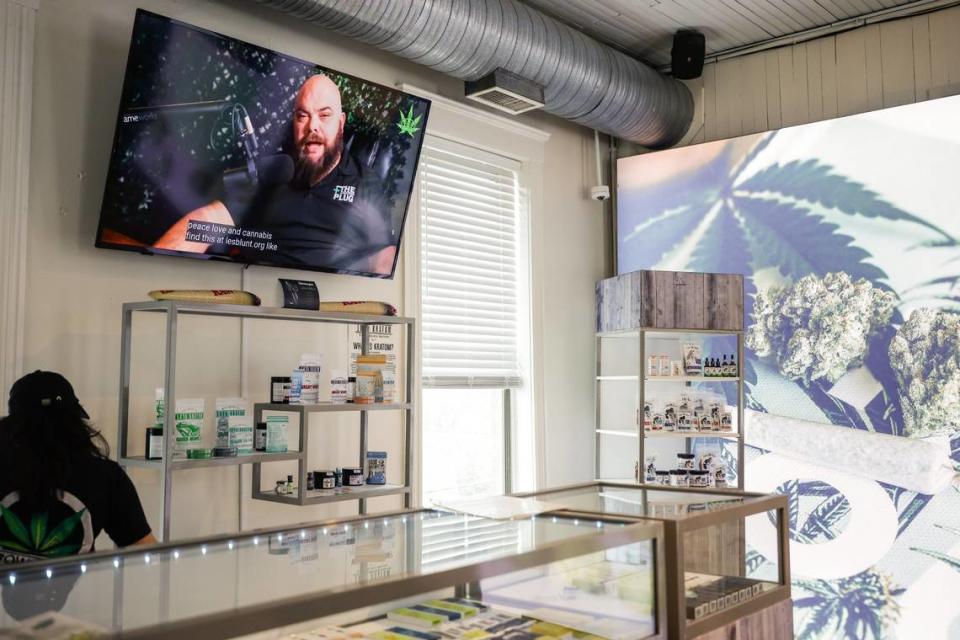
‘It’s the wild west’
Though state law allows dispensaries to carry different cannabis products — both for medical and recreational use — there aren’t many regulations at the state or federal level for the products sold. Dispensary owners aren’t required to test their products, and the lack of oversight on the hemp industry has led to potentially dangerous products on the shelves at some shops.
“A veritable alphabet soup of cannabinoids, including intoxicating cannabinoids, are prevalent throughout the marketplace within the state and beyond,” Phil Dixon with UNC School of Government said in a recent blog post.
“Under current state and federal law, there is no age limit for the use, possession, or sale of hemp and hemp products. There are also no restrictions on where it can be used or possessed, no amount limits, and no standardized health or quality assurance protections in place,” Dixon wrote.
By law, all hemp-derived THC products sold in the state are legal, as long as they have less than a 0.3% of delta-9 THC.
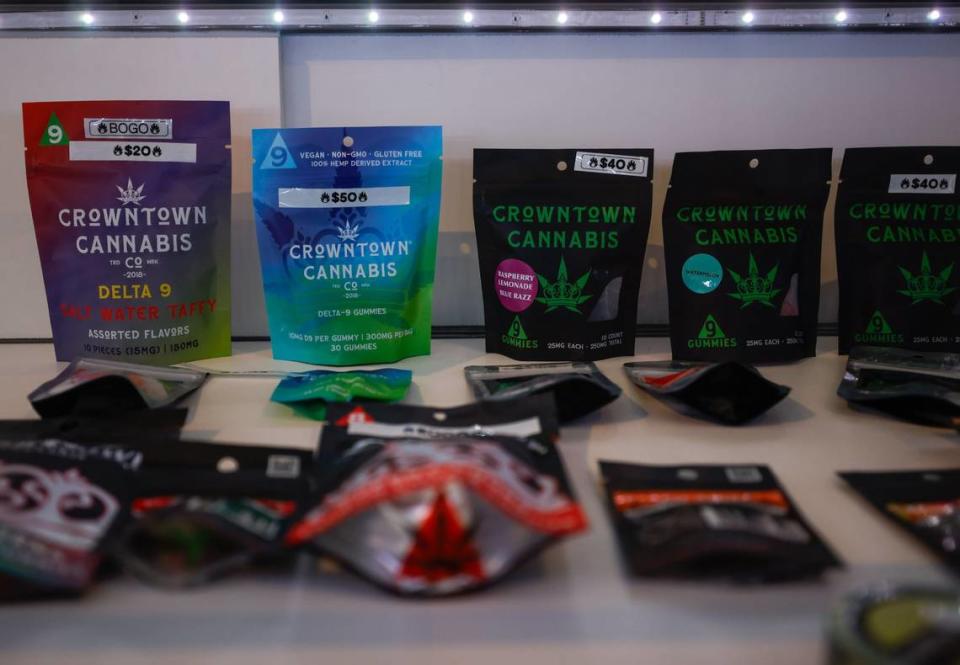
While some shop owners do their own testing for their cannabis products, there isn’t a system in place to regulate the concentration levels to ensure that they’re legal or safe.
“We don’t have a line or definition that says ‘Here’s where a product becomes synthetic. Here’s where it stays within the legal limit,” Dixon told The Charlotte Observer in an email.
“The only guidance we have is that it can’t have more than a 0.3% concentration of delta-9 when it leaves the farm, so there are no rules in effect.” he said. “Anyone can buy this stuff, anyone can sell this stuff, can possess it, can use it. You can use it anywhere. There’s no amount limits. There’s no concentration limits. There’s no restrictions on some of these exotic cannabinoids.”
“It’s the wild west, in terms of what’s available in the markets and what you might really be getting.”
Some dispensaries do their own testing
Though there are essentially no restrictions or regulations in place, Crowntown Cannabis, like other dispensaries, sends off their products to undergo additional testing before they hit the shelves. Crowntown uses G2 Analytical, a local cannabis testing company that checks to see if the content actually matches up with what’s advertised on the label.
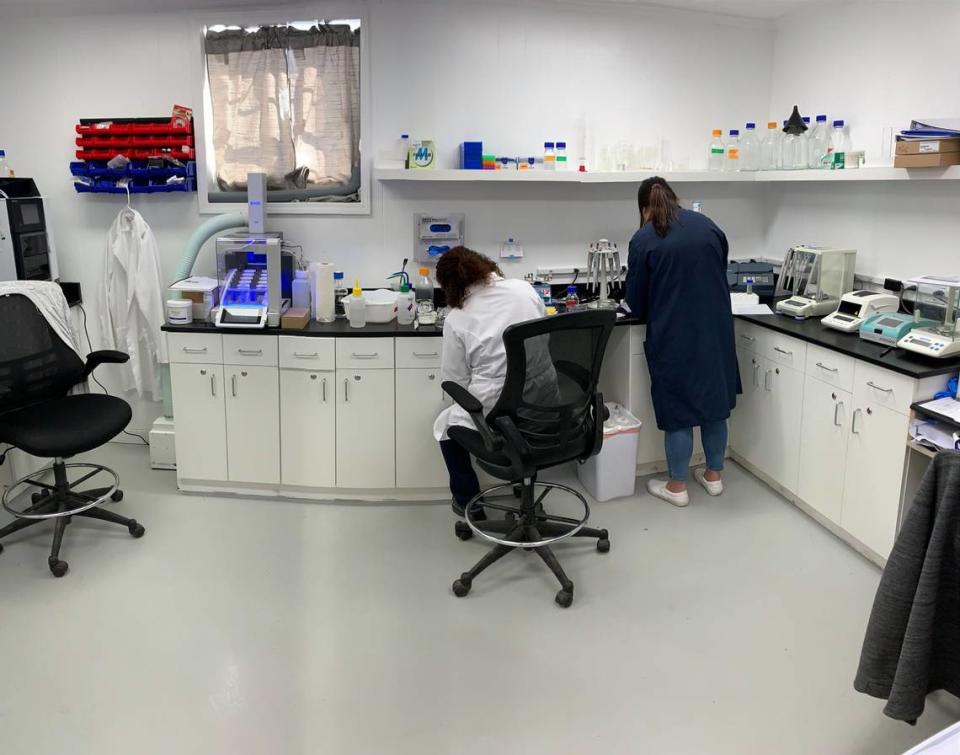
“We test for all of these major and minor cannabinoids, along with the THC levels in the product,” said Todd Griffin, chemistry and mathematics professor at Wingate University, CEO and chief scientist at G2 Analytical. “It goes through a processing chain and then quality control checks it at the very end to make sure that when the test was run, our quality checks pass and that the results are matching up with what’s in the system.”
Along with THC levels in products, G2 Analytical also looks for potential harmful substances, such as mold and pesticides, which can take between 3-10 days depending on the test and can range from $55-1,000.
“It’s a significant investment by the companies to make that kind of capital outlay and I think that’s probably why you don’t see more companies doing it,” Griffin said. “With no regulatory push to make it a ‘You either do this or you don’t sell the product,’ I think a lot of people are taking pass on that extra testing.
Per USDA guidelines, those growing hemp must have it sampled and tested, but hemp-derived products are a little less regulated, according to Griffin.
“The USDA, their authority kind of ends with the hemp plant because they’re agriculture. Anytime it transitions from agriculture to another product like cosmetics, food, drugs even, that then falls to the FDA,” Griffin told The Observer. “At the moment, the FDA doesn’t recognize any of this hemp as a drug so it’s kind of this unregulated area.”
What does that mean for law enforcement?
Given the lack of regulations, the current cannabis laws are also having an impact on law enforcement, specifically with identifying what’s legal and illegal.
This is something state crime labs are dealing with now, Dixon told The Observer.
“Our law enforcement labs and the state crime lab do not test for levels of delta-9 THC. They look for the presence of delta-9 THC but that’s present in both hemp products and marijuana products, so without an easy method to distinguish the two, many jurisdictions I think have basically just deprioritized this as a concern,” Dixon said.
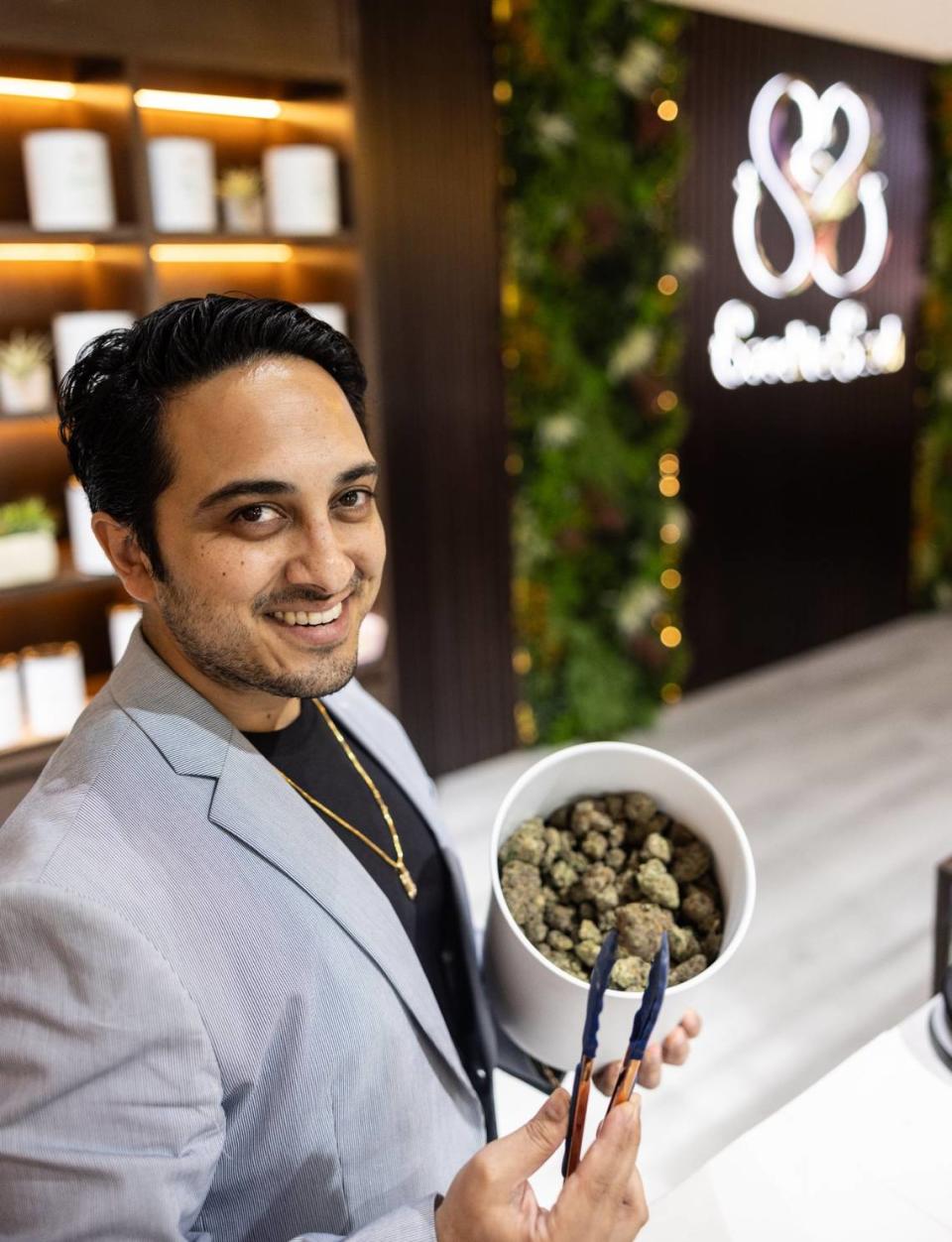
“Traditionally, the odor or sight of suspected marijuana has always been probable cause to detain somebody, to arrest somebody, to search them, to seize the substance, and there’s a plausible argument that that doesn’t really make sense anymore…Our courts have acknowledged that this is a potential problem but have not, so far, ruled squarely one way or the other.”
The Charlotte Observer asked the Charlotte-Mecklenburg Police Department and the Mecklenburg County Sheriff’s Office for interviews, but only received the following statement from CMPD: “Marijuana is currently illegal in NC. Officers have the discretion to enforce whether it is through verbal warnings, citations or arrest. CMPD encourages the issuance of citations or warning tickets when appropriate for these types of interactions pending cooperation is achieved and there are no other illegal factors involved.”
‘A crisis issue’
Ahead of the reauthorization of the Farm Bill, North Carolina Attorney General Josh Stein and 19 other AGs sent a letter to Congress about legislation they say has brought on a “crisis issue” impacting public safety.
In the letter, AGs called the current Farm Bill a “reckless policy” that has led to dangerous cannabis products falling into the hands of children, with little to no oversight from Congress, and urged lawmakers to close loopholes in the law that allow it to happen.
“Many states now face poisonings from poorly manufactured products, products with misleading labels, and consumption by individuals who are under the age of twenty-one,” the letter reads. “As hemp-based THC-infused products increase in popularity, particularly edibles, illicit suppliers have begun co-opting legitimate brand names and packaging to sell candy, snacks, and cereal that are intoxicating and confusing to consumers.”
Dixon said in his recent blog post that there seems to be support within the hemp industry to enforce safety measures, such as age limit regulations and accurate labeling.
“Beyond those broad, basic protections, advocates for the industry and regulators can have very different views on what the rules should look like on the ground. We will have to wait and see what, if any, regulations North Carolina ultimately adopts.”
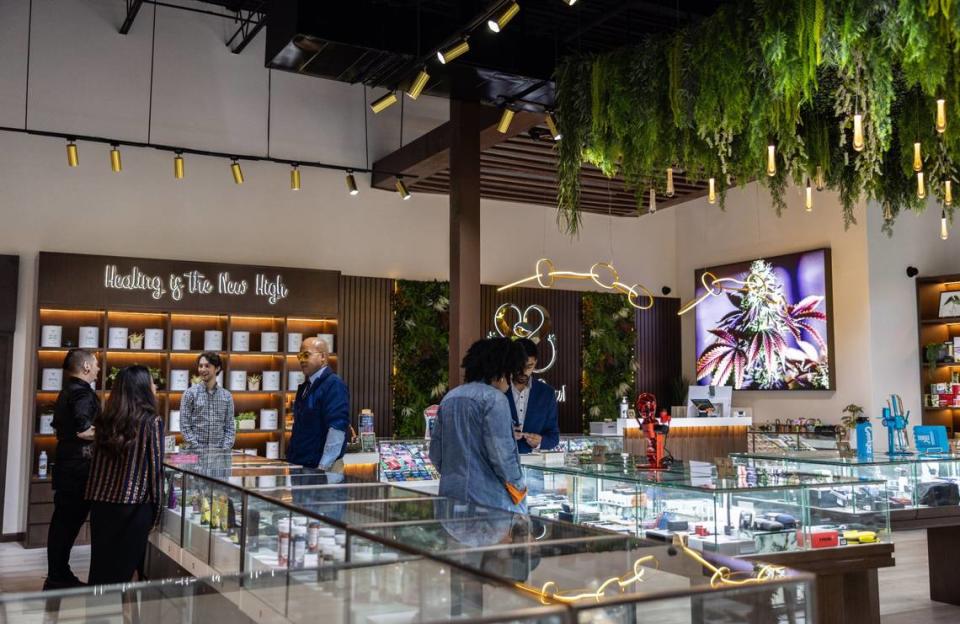
Who is the target market for cannabis products?
The owners of Seed to Soul and Crowntown Cannabis said they’ve seen a wide variety of customers of different ages come into their shops for many reasons, such as anxiety, pain relief and PTSD.
“I turned to cannabis products for a form of tranquility,” Charlotte resident Craig Patrick, a customer at Seed to Soul, told The Observer. “I tend to hold tension and be kind of high strung, but the cannabis products help me relax and bring me back down.”
While many turn to legal cannabis-related products for medical purposes, a lot of dispensaries and smoke shops also have special foods, drinks and other products— like candies, slushies and teas — that you can also snag for fun, too.
Aside from being able to sell products that they say help people the financial benefit for dispensary owners is massive, according to Sims.
“In the six years we’ve been open, we’ve done over $22 million in sales,” said Sims, who currently operates three locations in the Charlotte area and plans to open 14 more stores in the year. “We have over 52,000 active customers that we’ve accumulated over six years…the love and support from our customers is absolutely what keeps us going.”
U.S data backs up Sims’ experience. According to data gathered by Statista and reported in Forbes Health, the U.S. CBD market “witnessed exponential growth over the past decade. In fact, CBD accounted for $108 million in product sales in 2014, and by 2022, that number jumped to $1.9 billion.”

What are the risks of using these products?
While dispensary owners and marijuana advocates often advocate for the use of cannabis products to treat a variety of health conditions, federal agencies warn against the use of hemp due to limited data available on the substance.
According to the Centers for Disease Control and Prevention, there is not much known about how CBD affects the body over time, or how different ways of ingestion affect people.
The CDC says people who use CBD can experience the following side effects:
Liver damage
Interference with other medications
Drowsiness
Diarrhea or changes in appetite
Changes in mood, such as irritability
The agency also recommends against the use of CBD for children and people who are pregnant.
There haven’t been any reported deaths from hemp overdose, Sims said, but without regulations, many shops can carry synthetic products that could be harmful to consumers.
“It’s scary,” said Sims. “There’s no telling what’s in some of these products…everything from residual gasses and acids to harmful cancer-causing chemicals are in these products that aren’t being tested.”
He also mentioned that microbials, pesticides, herbicides, mold and mildew could be present in unregulated products, making them “very dangerous when consumed by humans.”
“We’ve kind of begged the industry to give us some structure around this to make it a more viable and legitimate industry, because we self-govern with testing, age verification and everything else. But that’s not being done across the board at other stores.”
The CDC also warns that dispensary products could have higher THC levels than advertised.
If a flower sample received by a lab exceeds the 0.3% limit, they are required to report it to the U.S. Department of Agriculture, Griffin said, adding that these instances have increased in the past few years.
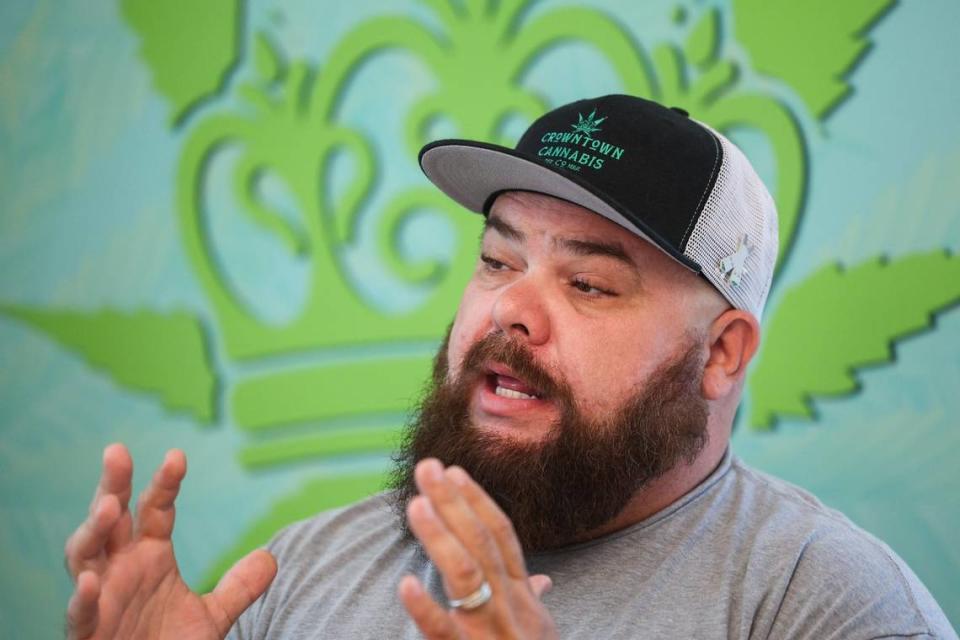
Dispensary owners argue for ‘medical value’
Despite the purported health risks, Sims argued that marijuana — and all the products derived from it, including CBD — should be removed from the federal Schedule I drug list due to its “medical value.”
The U.S. Drug Enforcement Administration defines Schedule I narcotics as “drugs with no currently accepted medical use and a high potential for abuse.”
However, in 2018 the U.S. Food and Drug Administration approved the use of Epidiolex, “a medicine that contains purified CBD from hemp, to help treat rare seizure disorders,” according to the CDC. More than 40,000 people have been treated with the drug since its approval, according to the manufacturer’s website.
“How can you say it has no medical value if we have FDA-approved drugs,” Sims said, referring to Epidiolex. “Whether you’re a supporter of cannabis or not, the scheduling is a huge issue.”

